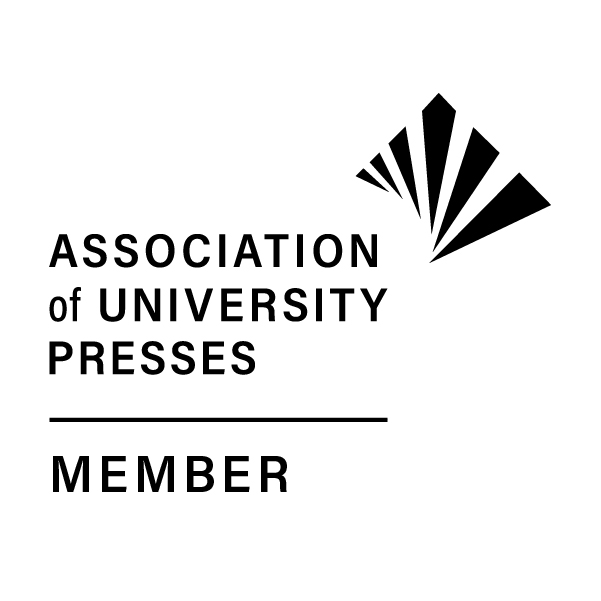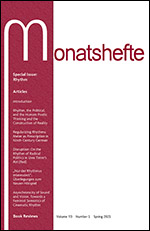|


|

Subscribe
Read the Journal Online
Submission Guidelines
Editorial Board
Receive Email Updates
Advertise in Monatshefte
Indexes/Abstracts
Current Issue TOC
Back Issues TOC
Monatshefte 2022 Subscription Rates
Institutions:
print & online $271
online only $233
Individuals:
print & online $103
online only $86
Non U.S. Postage (no postage charges for online-only subscriptions)
Airmail: add $40/yr.
Canadian Subscribers: add 5% GST. |
Monatshefte
Volume 110, Number 3, Fall 2018
Table of Contents
ARTICLES
Florence Feiereisen
Normierung als Angriff auf das Kulturgut Sprache? Die Geschichte der deutschen Rechtschreibreform im kulturellen Kontext
The history of standardizing written German speaks volumes about the relationship of the people of the “land of thinkers and poets” with their beloved language. For more than 150 years, any attempt to alter the written language, seen as the embodiment of the German cultural tradition, was met with skepticism or outright revolts. While pedagogues and linguists sought to streamline orthography rules to simplify written language acquisition for learners of all social backgrounds, prominent poets saw themselves as the gatekeepers of the German cultural heritage insisting, “Man vergreift sich nicht an der Mutter. Man spielt nicht mit dem Körper, der einen gezeugt hat“ (Durs Grünbein). Marking the tenth anniversary of the German orthography reform taking effect, this article explains the cultural significance of attempts to standardize written German by reading the history of standardization parallel to German history. (FF; in German)
Karin Schutjer
The Volksgeist in Kleist’s Volksblatt: “Das Bettelweib von Locarno” and the Berliner Abendblätter
This article interprets Kleist’s short ghost story, “Das Bettelweib von Locarno” as part of the author’s broader struggle to grasp the spirit of his audience, the German Volksgeist, which he conceptualizes within the philosophical framework of Kant’s epistemology and the political exigencies of the Napoleonic era. Specifically, I read the ghost story in the context of its publication venue, Kleist’s short-lived daily newspaper, Die Berliner Abendblätter. The story capitalizes on a crime story reported in the paper—an arson band terrorizing Berlin—and furthermore creates a heterogenous and uneven weave of information that recalls the texture of the newspaper and its incorporation of disparate sources. I argue that the Bettelweib narrative is constructed as a Herausgeberfiktion that aims, like the paper, towards an inclusive, multiperspectival take on its subject. The Volksgeist, if accessible at all, appears in the unfolding conversation enabled by this emerging media, the daily newspaper. (KS)
Yevgenya Strakovsky
Trauma and the Promise of Modernity in Gottfried Keller’s Dietegen
This article draws attention to Dietegen, a critically understudied novella by Switzerland’s foremost 19th century novelist, Gottfried Keller, in order to reevaluate the German realists’ engagement with modernity. Challenging a tradition of formalist interpretations, this close reading demonstrates that Dietegen is a psychologically precise and highly complex portrait of child abuse and its traumatic impact on long-term development. The novella’s portrait of trauma ultimately broadens into a parable of social progress. The repeated failure to recover from and transcend a violent past serves to question the limits of social reform, asking whether the ideals of modern society have the power to generate a sustainable future free of oppression. (YS)
Matthias Uecker
Experimental Fiction or Classical Story-Telling? Alexander Kluge’s Multi-Media Authorship
Alexander Kluge has created a huge oeuvre concerned with history and storytelling. His books combine short narrative forms into large constructions in which the different parts all complement each other and create a seemingly never-ending series of connections which endeavour to create a portrayal of the world—past, present, and future—both as it is and as humans imagine and wish it to be. Kluge’s story-telling challenges the established distinctions between genres and media as well as the distinction between fact and fiction. It also challenges established modes of publication and reception. While the organisation of Kluge’s books can be described as experimental, they make use of long-established forms of story-telling. This article will investigate the relationship between classical forms and experimental challenges in Kluge’s work. (MU)
Suzuko Mousel Knott
Yoko Tawada’s Shamans and “Schrift der Objekte”
This article analyzes the role of Yoko Tawada’s representation of shamanic practices in her literary essays and prose fiction as an extension of her concept of a “Schrift der Objekte,” first developed in her published dissertation Spielzeug und Sprachmagie. By turning the author’s poetological analysis of magic in European literature on her own works, we begin to understand how the ideas she was developing during the mid-1990s find their expression in her prose fiction from 1993 on. Studies on Eurasian shamanism by Mircea Eliade and Claude Lévi-Strauss, cited by Tawada in her dissertation and Tübinger Poetik-Vorlesungen, help shape the shaman figures of her texts. The shamanic narrating voices articulate their fluid subjectivity and shifting modes of narration through what I term here a “Schamanenschrift.” This is not to suggest that the author’s work should be reductively read as a form of modern or post-modern shaman-ism but is offered instead with the aim of demonstrating how shamanism can be viewed as one important part of a larger complex and multi-faceted poetology. (SMK)
Stuart Taberner
Memories of German Wartime Suffering: Russian Migrant Nellja Veremej’s Berlin liegt im Osten in Context
This article returns to a question posed by Andreas Huyssen (and others), namely whether and how minority writers can “migrate into” a German memory culture that is largely shaped by the “ethnic German” memory of German responsibility for the Holocaust. Here, however, the focus is on two “other” ethnic German memories that are arguably repressed in today’s Germany, namely German wartime suffering and the forty-year history of the German Democratic Republic. The article offers a close reading of Russian migrant writer Nellja Veremej’s 2013 novel Berlin liegt im Osten as a highly unusual—even unique—literary engagement with these “non-integrated” German pasts that not only critiques present-day Germany’s memory culture but also challenges what the novel frames as its self-satisfied liberal nationalism. A brief concluding section speculates on how “big history” and growing global consciousnes of the Anthropocene might impact our engagement with twentieth-century German and even world history. (ST)
REVIEW ARTICLE
Armin Schäfer
Unterbrechungen eines großen Kreislaufs. Neue Beiträge zur Goethe-Forschung
(Maertz, Gregory, Literature and the Cult of Personality: Essays on Goethe and His Influence, 2017. – Geulen, Eva, Aus dem Leben der Form. Goethes Morphologie und die Nager, 2016. – Wellbery, David E., Goethes „Faust I“. Reflexion der tragischen Form, 2016. – Richter, Karl, Poesie und Naturwissenschaft in Goethes Altersgedichten, 2016. – Lepper, Marcel, Goethes Euphrat. Philologie und Politik im „West-östlichen Divan“, 2016. – Guthke, Karl S., Goethes Reise nach Spanisch-Amerika. Weltbewohnen in Weimar, 2016. – O’Neil, Joseph D., Figures of Natality: Reading the Political in the Age of Goethe, 2017. – Kolle, Andreas, Instabile Weltverhältnisse. Augenblick und Ambivalenz der Zeitwahrnehmung bei Goethe, 2016. – Dönike, Martin, Jutta Müller-Tamm, Friedrich Steinle, Hrsg., Die Farben der Klassik. Wissenschaft – Ästhetik – Literatur, 2016.)
BOOK REVIEWS
Anders, Günther, Musikphilosophische Schriften. Texte und Dokumente. Hrsg. von Reinhard Ellensohn (Rolf J. Goebel)
Bürger, Christiane, Deutsche Kolonialgeschichte(n). Der Genozid in Namibia und die Geschichtsschreibung der DDR und BRD (Joachim Zeller)
Dupree, Mary Helen and Sean B. Franzel, eds., Performing Knowledge, 1750–1850 (Nicolas Pethes)
Fischer, Luke, The Poet as Phenomenologist: Rilke and the New Poems (Cat Moir)
French, Lorely, Roma Voices in the German-Speaking World (Klaus-Michael Bogdal)
Gaier, Ulrich, Wozu braucht der Mensch Dichtung? Anthropologie und Poetik von Platon bis Musil (Hannah V. Eldridge)
Görbert, Johannes, Mario Kumekawa und Thomas Schwarz, Hrsg., Pazifikismus. Poetiken des stillen Ozeans (Roman Lach)
Hajduk, Stefan, Poetologie der Stimmung. Ein ästhetisches Phänomen der frühen Goethezeit (Jan O. Jost-Fritz)
Herrmann, Martina G., Sophie Isler verlobt sich. Aus dem Leben der jüdisch-deutschen Minderheit im 19. Jahrhundert (Helen G. Morris-Keitel)
Kaminski, Nicola und Volker Mergenthaler, Zuschauer im Eckfenster 1821/22 oder Selbstreflexion der Journalliteratur im Journal(text). Mit einem Faksimile des Zuschauers vom April/Mai 1822 (Sean Franzel)
Kimmerle, Gerd, Unendliche Deutungen. Goethes „Wahlverwandtschaften“ – eine philosophische Lektüre (Marcus Bullock)
Kotowski, Elke-Vera, Hrsg., Salondamen und Frauenzimmer. Selbstemanzipation deutsch-jüdischer Frauen in zwei Jahrhunderten (Helen G. Morris-Keitel)
Krobb, Floria, Vorkoloniale Afrika-Penetrationen. Diskursive Vorstöße ins „Herz des Großen Kontinents“ in der deutschen Reiseliteratur (ca. 1850–1890) (Helmut Peitsch)
Leber, Manfred und Sikander Singh, Hrsg., Erkundungen zwischen Krieg und Frieden (Stephan Jaeger)
Neumann, Bernd und Gernot Wimmer, Hrsg., Der Erste Weltkrieg auf dem deutsch-europäischen Literaturfeld (Stephan Jaeger)
Sill, Oliver, Sexualität und Sehnsucht. Die Liebe in der deutschsprachigen Gegenwartsliteratur (Margaret McCarthy)
Wipplinger, Jonathan O., The Jazz Republic: Music, Race, and American Culture in Weimar Germany (Alan Lareau)
|

